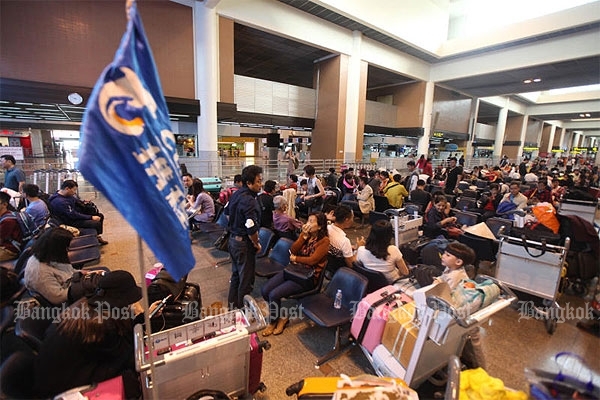
A City Airways flight to Hong Kong with more than 100 passengers was grounded at Don Mueang airport on Saturday after the airline became the third to face suspension this year.
The Civil Aviation Authority of Thailand said fresh doubts were cast over City Airways' safety standards and the airline missed a key deadline on Friday.
CAAT chief Chula Sukmanop told the Bangkok Post Sunday his agency found City Airways unsafe to fly and ordered the 8am flight E8-326 to Hong Kong grounded until the problem was rectified.
The flight suspension left 160 Chinese passengers stranded.
Mr Chula said the airline was responsible for taking care of the stranded passengers and finding alternative flights for them.
He said the Hong Kong aviation authority also raised a red flag on the airline's airworthiness in five areas. Two of the faults have to do with a co-pilot working without taking the mandated minimum break and the airline employing some untrained flight attendants.
The CAAT informed City Airways in advance that it would be allowed to operate only until Feb 12, unless the problems were solved. Regular City Airways' flights from Phuket to Hong Kong were also suspended yesterday on similar grounds.
City Airways management appealed to the CAAT for leniency, saying it had about 2,000 passengers booked for travel.
"But this is strictly a matter of aviation safety and so I told them no," he said.
The CAAT ran checks and discovered the airline has unpaid debts to Aeronautical Radio of Thailand and aircraft leasing firms.
Mr Chula said the CAAT will consider the airline's finances and decide if it is fit to conduct business in the aviation industry.
An aviation source said City Airways has unsettled bills worth about US$1 million (36 million baht) with several aircraft leasing firms in the US. The airline operates a Boeing 737 aircraft on its Don Mueang-Hong Kong and Phuket-Hong Kong routes.
The source added the airline was also behind in paying its pilots' salaries. Aircraft maintenance standards were also questioned. The airline charges low-priced fares, attracting mostly Chinese tourists.
A source in the Transport Ministry said small private airlines, particularly charters, have been monitored closely as some of them are prone to liquidity crunches and financial insolvency with cases pending in court. Air safety is also a major problem.
Founded in 2011, City Airways was originally owned by a group of Thai, Chinese and Hong Kong tour firms. There was a corporate shake-up with a new shareholding structure a year ago, a step which was reported to have turned the business around. City Airways could not be reached for comment.
The airline is the third to come in the firing line of the CAAT this year. On Jan 16, Business Air's operations were suspended after it was unable to settle debts estimated at one billion baht. The CAAT has rescinded the registration of the airline's only aircraft.
On Jan 27, the CAAT banned an aircraft belonging to Asian Air, a small Thai-owned, full-service airline, from leaving the navy-owned U-tapao airport in Rayong to pick up passengers in Macau before flying on to Palau, an island country in the western Pacific Ocean, after it received an order from the Central Bankruptcy Court to freeze the debt-laden airline's assets.
In the case of Business Air, the airline failed to settle debts valued at about one billion baht, which resulted in the halting of its operations and 700 passengers stranded at South Korea's Incheon airport and hundreds more at Suvarnabhumi airport.
The airline petitioned the Administrative Court, which agreed it could resume operations pending a final ruling on its debt burden. Thai aviation authorities told the airline it must improve its safety standards.
The airline, whose company was renamed to Intira Airlines from Business Air Center, has paid-up capital of 400 million baht. In the latest revenue filing to the Ministry of Commerce, the airline reported net sales of 3.97 billion baht with net profit of 57.4 million baht in 2013. Financial statements showed total revenues of 3.98 billion baht in 2013, but only four million baht in cash and bank deposits, and 400 million baht in debt.